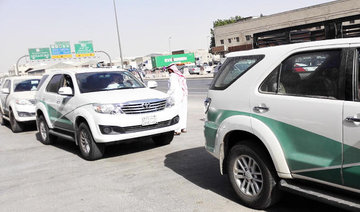MAKKAH: Innovators and entrepreneurs have been challenged to find ways to enhance the pilgrim experience in Makkah for people with mobility issues.
To help them develop solutions, provide support and encourage collaborations, the General Authority for the Affairs of the Grand Mosque and the Prophet’s Mosque, Umm Al-Qura University and investment business Wadi Makkah Co. organized a week-long event that began at the company’s headquarters on Sunday.
The specific goal is to improve pilgrim services through the development of innovative ways to help people who find it difficult to complete Hajj rituals such as Tawaf (walking around the Kaaba in the Grand Mosque seven times) and Sa’i (moving repeatedly between the Safa and Marwah hills at the mosque). The challenge includes four categories covering the use of manual wheelchairs, electric vehicles, golf carts and trailers, and a fifth, open section for creative mobility ideas.
Ali Al-Shaery, the CEO of Wadi Makkah, said he was proud of the company’s participation in this collaborative effort, and highlighted the significant role it can play in improving pilgrims’ mobility.
“We are contributing to realizing the Vision of our beloved kingdom, enriching the experience of pilgrims, and increasing the number of pilgrims and Umrah performers by 2030,” he said.
“Through this challenge, we aim to provide participants with a knowledge boost, cultural enrichment and empowerment through specialized workshops and expert mentors.”
The general authority is giving participants a sense of the nature of pilgrim-mobility issues, he added, while mentors from Wadi Makkah are providing technical, innovative and entrepreneurial knowledge.
A panel of judges from various sectors related to Hajj and Umrah will select the most promising solutions proposed during the event, Al-Shaery said.
Ammar Attar, a faculty member at Umm Al-Qura University and coordinator of the mobility vehicles category of the challenge, said it was important to engage the academic community in efforts to tackle real-world issues.
“We aim to activate the role of faculty members, students and researchers in designing creative and innovative solutions that enrich the Tawaf and Sa’i experience,” he said.
He added that 250 people on 39 teams are working with the best tools to develop innovative products and services that can best serve the needs of pilgrims.
Ahmed Morsi, an entrepreneurship projects engineer with Wadi Makkah, said participants in the challenge have been provided with the tools they need to help come up with ideas that can significantly improve the pilgrim experience through the use of manual and electric wheelchairs, golf carts and trailers.
“Mentors have been provided to offer guidance and advice during the challenge period in developing ideas, designing products and building the first model, with the aim of assisting innovators, entrepreneurs and the Makkah community in creating a conducive environment and providing all essentials for achieving success stories that enhance the experience of pilgrims and Umrah performers,” Morsi added.
Prizes of SR10,000 ($2,666) will be awarded to the best projects chosen by judges in each of the five categories.






























